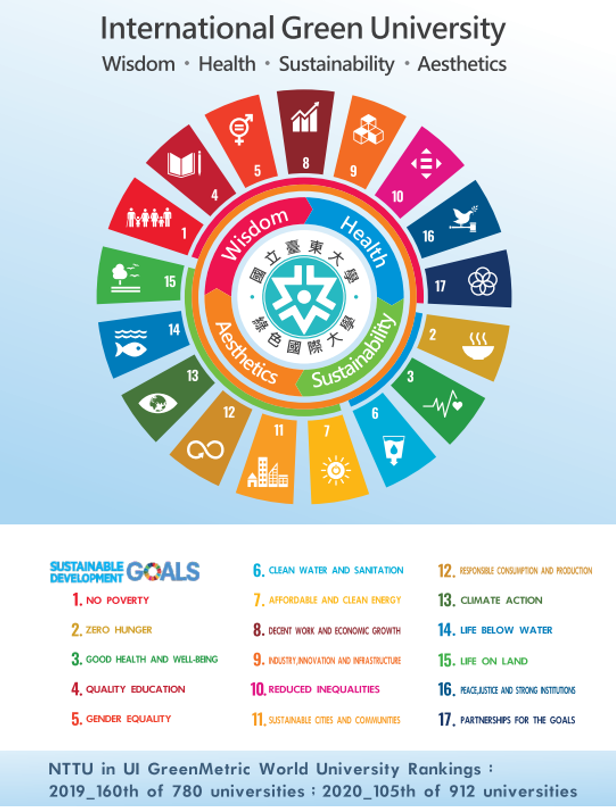BACKGROUND
The United Nations Environment Programme, in its 2014 Emissions Gap Report, argued that global carbon neutrality should be achieved between 2055 and 2070, otherwise the Earth will face climate change disasters. In 2015, the United Nations issued the “2030 Sustainable Development Policy“, announcing 17 Sustainable Development Goals (SDGs) and providing a shared blueprint for peace and prosperity for people and the planet, now and into the future. Now in the 21st century, a commitment to maintaining lives on Earth has arisen, as well as to practicing healthy dietary and living habits, physical and mental exploration, and personal growth, or Lifestyles of Health and Sustainability (LOHAS).
Universities are the base for cultivating talent in higher education. Universities also have the crucial mission of cultivating future citizens of the Earth and the obligation of educating and realizing sustainable development. In 1990, 20 university presidents and principals signed the Talloires Declaration in the international conference titled “The Role of Universities in Environmental Management and Sustainable Development” and unveiled the following action plans: (1) Raise awareness of the urgent need for an environmentally sustainable future; (2) encourage university culture in pursuit of a sustainable future; (3) cultivate environmentally literate and responsible citizens; (4) develop environmental literacy among university faculty members; (5) establish environmentally responsible university ecosystems; (6) encourage government–industry collaborations in environmentally sustainable development; (7) develop cross-domain exchange programs; (8) establish partnerships with primary and secondary schools; (9) strengthen national and international collaborations and services; and (10) continue the momentum for exchanges and support for implementing this declaration. The Talloires Declaration led to the rise of today’s global Green University movement. Particularly, University of Indonesia (UI) has launched UI GreenMetric World University Rankings since 2010. The rankings are based on the performance of sustainability in higher education institutions and allow comparisons between them. By 2020, 912 universities around the world have participated in the comparisons. Our institution promotes ourselves as a green university with "wisdom, health, sustainability, and aesthetics" as the connotation, and concretely implements SDGs. The Talloires Declaration led to the rise of today’s global Green University movement. Particularly, University of Indonesia (UI) has launched UI GreenMetric World University Rankings since 2010. The rankings are based on the performance of sustainability in higher education institutions and allow comparisons between them. By 2020, 912 universities around the world have participated in the comparisons. Our school promotes ourselves as a green university with "wisdom, health, sustainability, and aesthetics" as the connotation, and concretely implements SDGs. We aspire to influence individuals, families, schools, societies, countries, and even the whole world in their existence and lives through each university member’s sustainable development cultivation and actions.
National Taitung University was transformed from a normal college to a comprehensive university with three colleges of humanities, science and engineering, and normal education in 2003.The Zhiben campus formally replaced the Taitung campus as the main campus in 2014. Zhiben campus is an all-new campus based on green architecture and natural ecology owning a unique environment surrounded by mountains and seas.
In 2109, NTTU’s Library and Information Center received the FIABCI World Prix d’s Excellence Award in Public Infrastructures/Amenities for providing quality library and information services. Supported by Taitung’s rich natural resources and diverse cultures, the Library and Information Center exerts influence in the form of the green university’s knowledge collection and action learning.
Furthermore, to assist the transformation and upgrading of local industries, the pilot plant of NTTU’s East Taiwan Bio-Economic Center was launched at the end of 2019. In addition to local joint efforts to create sixth-industry efficacy in agriculture, forestry, fishing, and animal husbandry, the pilot plant plans to report the carbon footprints of its products in the future.
Since 2003, the University has established a steady and strong foundation for an outstanding green university through building upward and downward consensus, and will gradually develop into an international green university that supports the sustainable development of a green knowledge economy.

